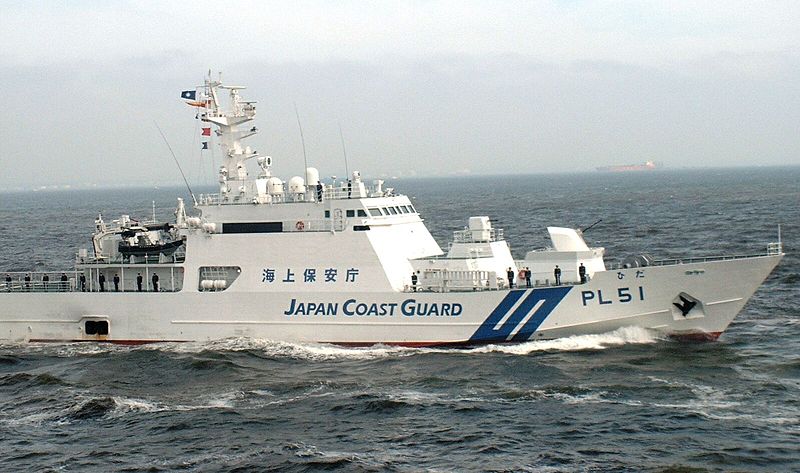Toshi Yoshihara and James R. Holmes, Japanese Maritime Thought: If Not Mahan, Who? Naval War College Review, Summer 2006
“New Fighting Power!” Richard J. Samuels, Japan’s Growing Maritime Capabilities and East Asian Security International security [0162-2889] Samuels yr:2007 vol:32 iss:3 pg:84 -112
"Japan's security policy: from a peace state to an international state" Singh, Bhubhindar The Pacific Review, vol. 21, no. 3, pp. 303-325, July 2008
Wu Xinbo, “The end of the Siler Lining: A Chinese View of the US-Japan Alliance,” Washington Quarterly 29:1 (119-130)
The first two were both about Japanese naval forces, and so I'll tackle them together.
Yoshihara, Holmes, Samuels: Yoshihara and Holmes seem particularly worried about a lack of strategic focus for the Maritime Self-Defense Force, the name for the modern Japanese navy. They write that the Japanese seem to have decided to focus on ways to complement the US Navy, rather than field their own, independent naval force. They point out that China is building a Navy along Mahanian lines, and cites this as a reason for Japan to go back to thinking about grand strategy and the build-up of its own navy. They also state (without much support) that relying on the American security guarantee is dangerous, and that Japan needs a naval force capable of defending the country's interests on its own.
I do not understand this line of thinking, either for Japan or for Western Europe. (In South Korea's case, with a presumably implacable enemy across a very short DMZ, it makes much more sense.) There is more to security and prosperity than the military, and relying on the US (and possibly even free-loading on the US) provides so many benefits, it makes sense to tailor your force to what can boost the US rather than duplicate its efforts. If the US tried to make its force a mini-USN, it will not contribute much to any hypothetical war, since the US has much more of any given piece of equipment. Making instead the things that the US needs (like minesweepers) strikes me as a perfectly intelligent strategic move.
I'm also skeptical of the near idolatry of "grand theorists" at work in this piece. Why do the Japanese need to find one person and apply his theory to the overall structure of naval composition? Why is a pragmatic, ad hoc process not acceptable? (And, if you did decide to use one theorist as the backbone for your force structure, would you want to announce that fact? Would it give up too much information about likely responses?)
I find the Samuels piece much more interesting. It shows how the Japanese have managed to beef up their military without breaking their own Constitution or self-imposed limits, by instead creating what may be the world's greatest Coast Guard. The Japanese Coast Guard (JCG) has taken on many of the missions of normal navies, such as reinforcing claims of sovereignty to dispute islands. It has also become a large part of Japan's soft power, being deployed in emergencies and natural disasters.

I found it particularly interesting that the JCG was explicitly modeled on the USCG. They are both technically civilian agencies, despite having uniformed personnel and military missions. The USCG is, in fact, a stronger navy than many state navies, including Canada's. The JCG is seeking the same kind of strength, without actually raising the military budget and upsetting Japan's neighbors.
Most importantly, though, it shows that (even if Japan lacks a "central thinker") it is obvious that the Japanese leaders are paying careful attention to maritime issues while still trying to avoid ruffling feathers. This is a much better approach than that put forward by Yoshihara and Holmes, who are focusing too much on grand strategic theories and not enough on the actual position that Japan is in. Japan is a small island chain with a history that leads to distrust. Announcing the creation of a giant, fully independent navy would hurt its economics; having a niche military attached to the world's strongest, along with a Coast Guard able to do what is necessary to defend the country is a better idea.
Wu: This thinking leads naturally to the Wu Xinbo piece. Unfortunately, Japan may be running into trouble with China anyway. According to Wu, China is increasingly worried about a resurgent Japanese military, and sees the US as the one instigating this increase in Japanese power. China has long viewed the US alliance as the major factor keeping Japanese military power low, but now the US has started pushing Japan to increase its military power instead. From the US perspective, this is just to end the Japanese "free-ride" on the US, but it is incredibly nerve-wracking for the Chinese. Besides the historical issues (like World War 2), there is a fear that Japan and the US are trying to encircle China and keep it from taking its "rightful place" on the world stage.
Interestingly, the former Japanese colony of Taiwan has been included in the overall defense planning of Japan, with some vague ideas about defending the island from a mainland attack. This obviously infuriates China (which has long maintained that Taiwan is an essential part of China that has long been the target of various other powers). That the overall security system in East Asia is basically made up of various American bilateral security guarantees (to Japan, South Korea, Taiwan, the Philippines, etc.) that explicitly leaves China out (rather than the preferred multilateral one with China as a major player) continues to imply all sorts of maneuvering against China.
The overall suggestion of the article is, in short, for Japan and the US to be more inclusive of China, and to not make threatening statements about Chinese capabilities and intentions. While it is hard to disagree with this notion, it overlooks the various reasons why people are distrustful of China. It is interesting that this writer made the same mistakes that so many American writers do. It assumes that the international readers will automatically assume the benevolent intentions of the large power with all the military hardware.
The last piece, by Singh, is a very constructivist take on the overall strengthening of the Japanese military. Singh traces a few different strains in Japanese "identity", particularly the ideas of Japan as a "peace state", a "normal state", and an "international state". It provided a fascinating history of Japanese efforts to rearm, and made a good case that today's Japan is doing so at least in part to live up to its responsibilities as an "international state", since important states do things like respond to tragedies and help with peacekeeping.

No comments:
Post a Comment